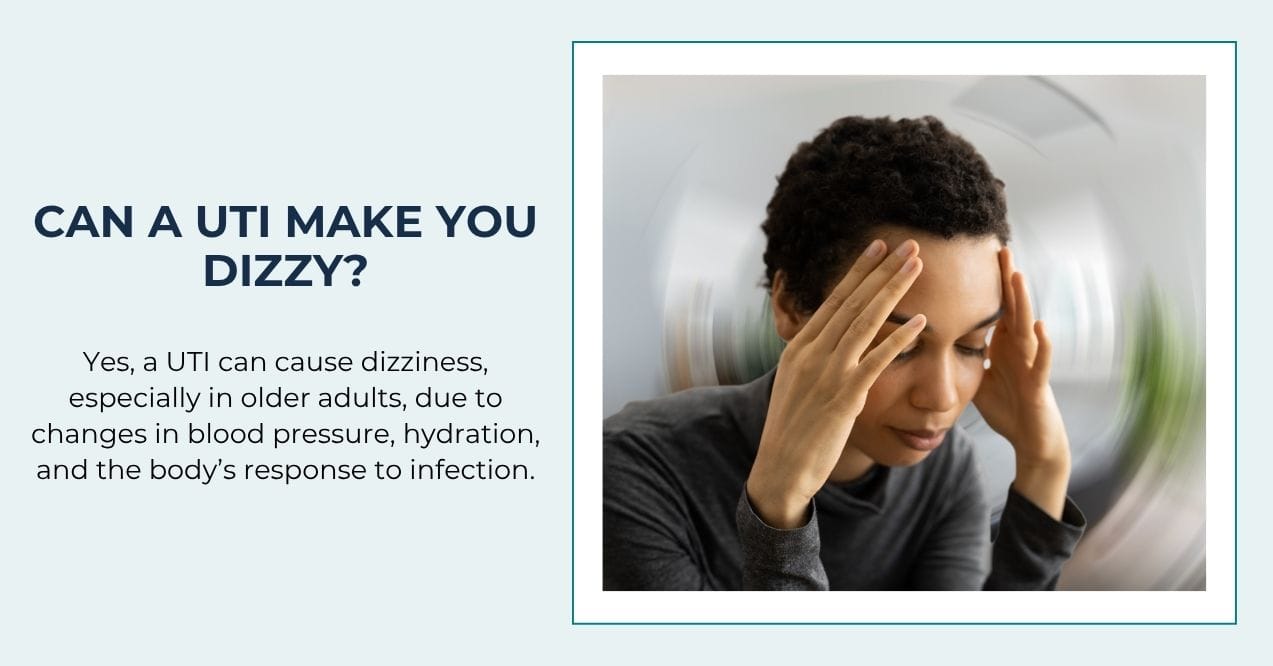Feeling Dizzy with a UTI? Here’s Why
Can a UTI make you dizzy? Indeed. Learn how fluid loss, low blood pressure, and systemic effects may create dizziness during infections.


Most people expect burning, urgency, or bladder pressure with a UTI—but what if you’re feeling lightheaded or woozy instead? Can a UTI make you dizzy? The answer is yes, particularly in adults over 60 or those with recurring infections. Dizziness isn’t the most common UTI symptom, but it’s an important one that often goes unrecognized.
Understanding UTIs and Their Common Symptoms
A urinary tract infection happens when bacteria enter and multiply in your urinary system. Women face higher risk due to their shorter urethra, while people with urinary retention issues also experience more frequent infections. The bacteria E. coli causes about 90% of UTIs, traveling from the intestinal area into the bladder.
UTIs affect different parts of the urinary system. Lower UTIs involve the bladder and urethra, while upper UTIs reach the kidneys. Each type brings its own set of symptoms, though most people experience the classic signs listed below.
Common symptoms of a UTI
- A strong, persistent urge to urinate
- A burning sensation when urinating
- Passing small amounts of urine frequently
- Cloudy, strong-smelling, or dark urine
- Pelvic or lower abdominal pain
- Blood in the urine
- Low-grade fever or chills
- A sense of incomplete bladder emptying
While these are standard symptoms, some people—especially older adults—may experience less obvious signs like dizziness or confusion. UTIs in older women often present differently, with cognitive changes sometimes being the first noticeable symptom rather than the typical pain or urinary issues.
Can a UTI Make You Dizzy?

Yes, a UTI can make you dizzy, though it’s not among the primary symptoms most people experience. The infection affects your body beyond just the urinary tract, especially when it becomes more severe or spreads. Dizziness occurs when the infection triggers systemic responses that affect your blood pressure, hydration levels, or overall body balance.
Older adults particularly may notice dizziness as one of their main UTI symptoms. Their immune systems often respond differently to infections, producing less localized symptoms. Instead of just bladder pain or burning, they might feel unsteady, confused, or weak. This makes UTI diagnosis more challenging in this age group.
The connection between UTIs and dizziness involves several body systems working together. When fighting infection, your body uses resources that normally maintain balance and blood pressure. This shift can leave you feeling lightheaded or unsteady on your feet.
Why a UTI Might Lead to Dizziness
Several factors explain why urinary infections trigger dizziness in some people. Dehydration tops the list, as frequent urination depletes your body’s fluid levels. Many people also drink less water to avoid bathroom trips, not realizing how dehydration affects UTI risk and symptom severity. This creates a cycle where fluid loss leads to lightheadedness.
Low blood pressure frequently accompanies UTIs, especially when standing up quickly. The infection causes blood vessels to dilate as part of the inflammatory response. Combined with dehydration, this drop in blood pressure creates that spinning sensation many describe. Your cardiovascular system works harder during infection, sometimes struggling to maintain steady blood flow to the brain.
Systemic inflammation from the infection affects multiple body systems simultaneously. White blood cells release chemicals to fight bacteria, but these substances also influence blood pressure and nerve function. The result may include balance problems, weakness, and that general feeling of being “off.” Electrolyte imbalances from fluid loss compound these effects, disrupting normal nerve and muscle function.
Who’s Most Likely to Feel Dizzy from a UTI?

Certain groups face higher risk of experiencing dizziness with their urinary infections. Adults over 60 lead this list, as their bodies often respond to infections with less typical symptoms. Can a UTI make you tired and dizzy at this age? Absolutely—fatigue and dizziness may even appear before traditional bladder symptoms.
People managing chronic health conditions like diabetes or heart disease also experience more dizziness with UTIs. Their bodies already work harder to maintain balance and blood pressure. Adding an infection tips this delicate balance, leading to lightheadedness or unsteadiness. Those taking multiple medications face additional risk, as some drugs interact with the body’s infection response.
Dehydration-prone individuals develop dizziness more readily during UTIs. This includes people who limit fluids due to incontinence concerns or those taking diuretic medications. Anyone with a history of orthostatic hypotension—blood pressure drops when standing—will likely notice increased dizziness during urinary infections. Previous kidney infections or recurring UTIs also raise the likelihood of experiencing these less common symptoms.
These factors also highlight a broader concern: balance issues in elderly individuals can become more pronounced during urinary infections. Fatigue, dizziness, and changes in hydration can all contribute to increased fall risk, making it even more important to address UTIs promptly in older adults.
Other Atypical Symptoms of UTIs
UTIs don’t always follow the textbook, particularly in vulnerable populations. Beyond dizziness, several unexpected symptoms may signal a urinary infection. Recognizing these signs helps catch infections early, before they progress to more serious complications.
Less common UTI symptoms include:
- Nausea or vomiting
- Fatigue or low energy
- Mental fog or confusion
- Muscle aches
- Loss of appetite
- Fever without urinary discomfort
These atypical signs often lead to delayed diagnosis. An older adult might seem confused or weak without any bladder complaints. Someone might feel exhausted and achy, assuming they have the flu. Mental changes particularly affect seniors, sometimes mimicking dementia symptoms. Healthcare providers now recognize that UTIs can present quite differently in older adults versus younger patients.
Support for Ongoing UTI Discomfort
Managing UTI symptoms requires both immediate relief strategies and long-term prevention approaches. Hydration remains the cornerstone of recovery, helping flush bacteria while combating dizziness from fluid loss. Rest allows your body to focus energy on fighting infection rather than maintaining daily activities.
Creating a bladder-friendly environment speeds healing. This means avoiding irritants like caffeine, alcohol, and spicy foods during active infections. Warm compresses on the lower abdomen may ease discomfort. Some people find relief through specific positioning, such as elevating their legs to improve circulation and reduce dizziness.
If you’re looking for added support while managing urinary tract discomfort, UT Fix by PureHealth Research is formulated with ingredients traditionally used to maintain a clean urinary tract and support microbial balance. It’s ideal for people seeking a natural way to support bladder and urinary wellness between flare-ups.

How to Prevent UTIs and Related Symptoms Like Dizziness
Prevention strategies reduce both UTI frequency and the dizziness that may accompany infections. Simple daily habits make a significant difference in urinary health. Consistency matters more than perfection—small changes maintained over time yield the best results.
Key prevention steps:
- Stay consistently hydrated throughout the day
- Don’t hold in urine longer than necessary
- Wipe front to back after bathroom use
- Urinate after sexual activity
- Avoid excessive use of irritating hygiene products
- Eat foods that support urinary health (cranberries, probiotics)
Proper hydration deserves special attention since dehydration both triggers and worsens UTIs. Aim for pale yellow urine as a hydration marker. Spreading water intake throughout the day works better than drinking large amounts at once. This steady hydration helps maintain blood pressure and reduces dizziness risk while keeping bacteria flushed from your system.
When to See a Healthcare Provider

Dizziness accompanying UTI symptoms warrants prompt medical attention, especially for older adults. Don’t wait for symptoms to worsen—early treatment prevents complications. Untreated infections may spread to the kidneys, causing more severe illness and increased dizziness risk.
Seek immediate care if dizziness occurs with high fever, severe back pain, or vomiting. These signs suggest the infection has progressed beyond the bladder. Confusion or significant weakness also require urgent evaluation.
Can a UTI cause bloating along with these symptoms? Yes, and this combination often indicates a more serious infection needing professional treatment.
Regular UTI sufferers should discuss prevention strategies with their healthcare provider. This includes reviewing medications that might increase infection risk or contribute to dizziness. Some people benefit from preventive antibiotics or other targeted approaches. Don’t accept recurring infections as inevitable—solutions exist for most situations.
Final Words
UTIs can indeed make you dizzy, though this symptom often surprises people expecting only bladder-related complaints. The connection involves dehydration, blood pressure changes, and systemic inflammation working together. Older adults and those with chronic conditions face the highest risk of experiencing dizziness during urinary infections. Recognizing these less common symptoms leads to faster treatment and better outcomes.
Yes, especially in older adults or during more severe infections. The dizziness results from dehydration, low blood pressure, and the body’s inflammatory response to infection. While not the most common symptom, it’s significant enough that healthcare providers now recognize it as a potential UTI sign.
Possibly. Dizziness can indicate dehydration, low blood pressure, or systemic effects from the spreading infection. It may suggest your body struggles to maintain normal functions while fighting bacteria. Any new or worsening symptoms deserve medical evaluation to prevent complications.
It varies, but with treatment and hydration, symptoms should improve in a few days. Most people notice reduced dizziness within 24-48 hours of starting antibiotics. Complete resolution typically occurs as the infection clears, usually within a week of beginning treatment.
Stay hydrated, rest, and avoid sudden changes in position. Seek medical help if it worsens. Rising slowly from sitting or lying positions prevents blood pressure drops. Electrolyte drinks may help restore balance faster than water alone.
Sign up for our Healthy Living newsletter!
Advertisement. This site offers health, wellness, fitness and nutritional information and is designed for educational purposes only. You should not rely on this information as a substitute for, nor does it replace, professional medical advice, diagnosis, or treatment. If you have any concerns or questions about your health, you should always consult with a physician or other health-care professional. Do not disregard, avoid or delay obtaining medical or health related advice from your health-care professional because of something you may have read on this site. The use of any information provided on this site is solely at your own risk.










